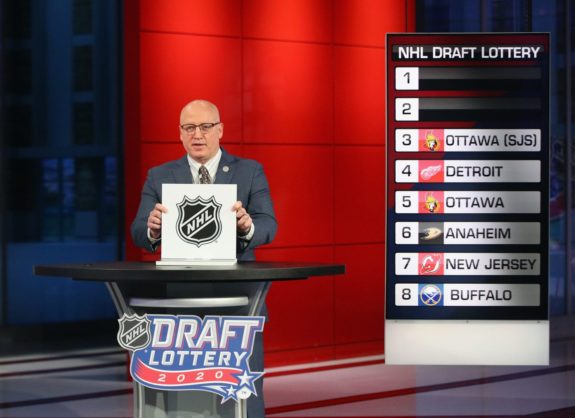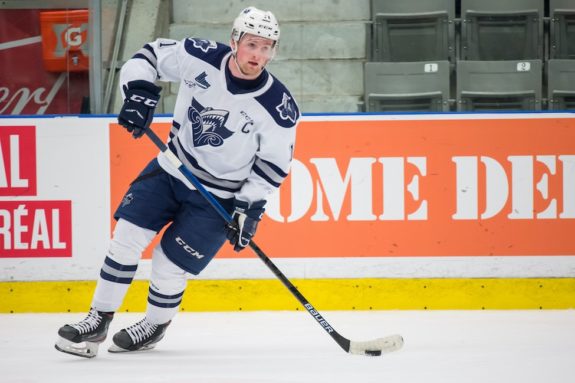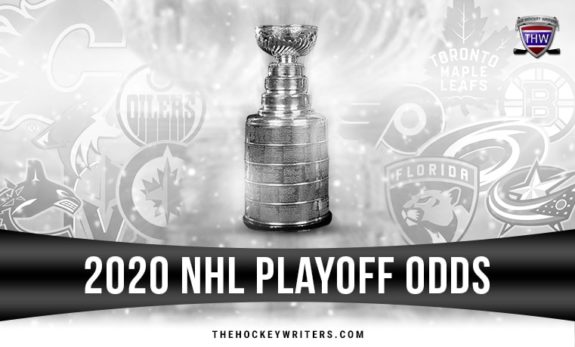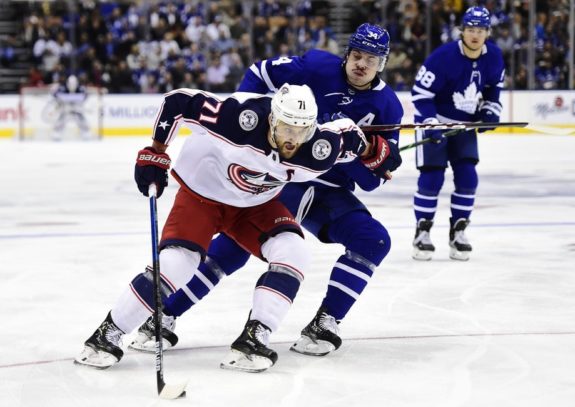Prior to the 2019-20 Stanley Cup Playoffs, we’ll see the so-called Qualification Round. Each winner of the eight best-of-five series (four in each conference) goes on to the actual playoffs. The loser of each series has an equal chance (12.5%) of getting the first-overall pick in the 2020 Entry Draft. Is it worth losing in the Qualification Round for the possibility of the top draft pick?

There’s a lot at stake here, with some extremely talented young men – possible franchise leaders – available for the first pick of the draft. Most mock drafts and draft projections show left wing Alex Lafreniere (or center Quinton Byfield) as most likely to be taken #1.
Related: An NHL Placeholder Team Wins Draft Lottery
In the draft lottery held June 26, the Detroit Red Wings had the best odds, with the Ottawa Senators holding both of the next two possibilities. However, they call it a lottery for a reason – balls bounce, cards flip, numbers are picked. Detroit and Ottawa missed out on the top pick. That pick will go to a team that losses a Qualification Round series. A second lottery will be held after the Qualification Round to determine which team actually get the top pick.
The 2020 NHL Draft Order
The Los Angeles Kings have the second pick, Ottawa will draft third and fifth, and Detroit will have the fourth pick. Ottawa’s third pick is from the San Jose Sharks, part of the Erik Karlsson trade in Sept. 2018. The as-yet-unknown Qualification Round losing teams were represented in the draft lottery by “placeholders.” Each of the eight placeholder spots had a 2.5% chance of winning the top spot.
Detroit had an 18.5% chance of winning the top spot. Ottawa’s own first-round pick had a 13.5% chance and the pick from San Jose had an 11.5% chance. Los Angeles had a 9.5% chance. When you do the math, those eight placeholders, at 2.5% each, had a combined 20% chance of selecting first in the draft.

Here’s the top of the 2020 NHL Draft order:
- The as-yet-undetermined Qualification Round loser.
- Los Angeles Kings
- Ottawa Senators (from San Jose)
- Detroit Red Wings
- Ottawa Senators
- Anaheim Ducks
- New Jersey Devils
- Buffalo Sabres
Picks 9-15 will be assigned to the other 7 teams that lose in the Qualification Round. The rest of the first round (16-31) will be determined by the results of the actual Stanley Cup Playoffs (with various trades involving conditional draft picks coming into play).
Tanking a Series in the NHL?
So, the question for the teams playing in the Qualification Round is this: Do you want to intentionally lose your Qualification Round series and have a 1-in-8 chance of the first pick in the draft, or does it make more sense for your franchise to go as far as possible in the race for Lord Stanley’s Cup?
This is the NHL, hockey at its highest level, and the commonly held belief is “Players never throw a series, but organizations might.” From a cynical point of view: Which puts more dollars in your pocket next season, winning a round or two in the playoffs or picking a probable superstar in the draft?
Related: 2020 NHL Draft: Reviewing Top 10 Mock Scenarios for Prospects
If a team was to do something as obvious as not putting its best players into the games, minimizing their ice and power play time, or perhaps starting a backup goalie who is substantially less effective that the starter, the hockey world would notice. After all, NHL players would not want to have their careers tainted by a scandal along the lines of baseball’s 1919 Black Sox.
But what if a team, trying its best, drops the first two games of the best-of-five series? Pull out all the stops, press the pedal to the metal, and shoot for three straight wins? Even if that risks injury to your star players and would leave your team exhausted and in poor condition to compete effectively in the first round of the actual Stanley Cup Playoffs?

We’re talking about the NHL, not a beer league. Players’ pride and desire for success should never be questioned. Management, on the other hand, is sometimes a strange creature. Could an owner demand or order that a coach “in the team’s best interests” not win Game 3? Would a coach comply, or would he risk his job by telling the people who write the checks to go to H-E-Double-Hockey-Sticks?
The Range of the NHL Qualification Round
Some of the teams in the Qualification Round have virtually no chance of winning the Stanley Cup this year. For example, the Montreal Canadiens had almost no shot at earning a playoff berth if the 2019-20 season had not been cut short by the COVID-19 pandemic. Yet there they are, in the Qualification Round, ranked last (#12) in the Eastern Conference, facing a series against the #5 Pittsburgh Penguins. The Canadiens finished the regular season with 71 points in 71 games; the Penguins earned 86 points in 69 games.
Related: Korpisalo or Merzlikins: Which Blue Jackets Goalie Starts?
At the other end of the Eastern Conference Qualification Round spectrum are the Columbus Blue Jackets. The Blue Jackets were tied for the last wildcard spot in the East when the regular season ended. They will play the Toronto Maple Leafs in the Qualification Round.

Columbus’ hard-nosed, physical style produced results last year with a sweep of the Presidents’ Trophy-winning Tampa Bay Lightning in the first round. Could that team, with the stellar goaltending of Elvis Merzlikins and Joonas Korpisalo, go deep into the playoffs this year? Would winning a couple of rounds (or, fasten your seatbelt, the Cup) sell more season tickets for 2020-21 than a top draft pick?
In the Western Conference, the Qualification Round matchups also have quite the range. The #5 Edmonton Oilers (83 points in 71 games) versus the #12 Chicago Blackhawks (72 points in 70 games) and the #8 Calgary Flames (79 points in 70 games) against the #9 Winnipeg Jets (80 points in 71 games). Although the Jets earned more points during the regular season, the Flames get the higher seed based on percentage of points earned (.564 vs. .563) – a mere whisker separating the teams in the standings.
NHL Playoff Success or Draft Possibility?
If a placeholder for a Qualification Round losing team had not been selected, the earliest any of those teams could pick would have been #9. The idea of tanking a series for a 1-in-8 chance at the eighth-overall pick certainly wouldn’t be the subject of conversation. However, that’s not to say that there aren’t some extremely talented players available in the middle of the first round of this draft.
But the team drafting first will be determined in a second draft lottery among the Qualification Round losing teams. Does it make sense in the long term, from an organizational point of view, to possibly get a potential superstar by losing that initial (not-really-a-playoff) best-of-five series? Or should a team try its very best to go as far as possible in the Stanley Cup Playoffs? To tank or not to tank, that is the question.